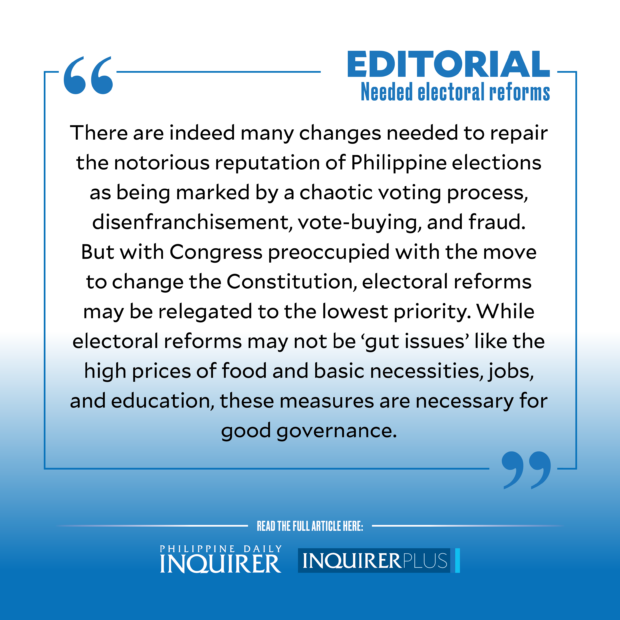Needed electoral reforms
 At the end of a three-day summit held earlier this month, the Commission on Elections (Comelec) submitted to President Marcos a set of recommendations to improve the country’s electoral process and make it truly representative of the people’s will expressed through the ballot.
At the end of a three-day summit held earlier this month, the Commission on Elections (Comelec) submitted to President Marcos a set of recommendations to improve the country’s electoral process and make it truly representative of the people’s will expressed through the ballot.
The key recommendations include upgrading technology and implementing a hybrid voting process following the breakdown of thousands of automated vote counting machines (VCMs) in the 2022 national elections.
Using modern technology would make the election system more reliable, and with faster and accurate transmission of results, the President noted. He also batted for “recalibrating the capacity” of teachers as members of the electoral board, and integrating voter education into the school curriculum.
“So as we engage with discussions amongst our students and the Filipino youth; we likewise promote and encourage them to form and cast an informed vote, as well as discerningly choose the leaders of our society,” Mr. Marcos added.
Comelec chair George Garcia said a key policy directive awaited from the President was whether the commission would replace its 97,000 aging VCMs. In the 2022 presidential and local elections, more than 1,300 VCMs malfunctioned, leading to hours of waiting for voters who were offered the option of leaving their filled-out ballots for the election officers to later feed into the machines. This cast widespread doubts on whether their votes were faithfully counted.
“The President told me [that] if the machines really need to be replaced, then so be it. Let’s change the system,” Garcia said, adding however that it was up to Congress whether or not to allow a hybrid voting system to enable both automated and manual vote counting and transmission.
Prior to the summit, Garcia proposed several reforms to improve the country’s elections. These include advancing the effectivity of premature campaigning, expanding the scope of vote-buying and vote-selling, amending the Party-List System Act to redefine the marginalized and underrepresented sectors, and allowing early voting for persons with disabilities, pregnant women, and the elderly.
In a TV interview, Comelec spokesperson Rex Laudiangco said that the commission wants to broaden the scope of vote-buying and vote-selling as he noted that using e-wallets to buy votes was one of the big challenges encountered in the 2022 elections. “We have asked Congress to expand the definition of vote-buying so that we will be able to connect the act to the principals—the politicians,’’ Laudiangco said.
This would indeed be a much-desired outcome since no major candidate has been charged and haled to court for vote-buying, even if the offense is said to be openly committed in many parts of the country come election time. Garcia meanwhile proposed that “premature campaigning” be deemed an election offense starting at the filing of certificates of candidacy instead of during the campaign period. Another suggested reform is to have a clearer definition of election expenses that, Laudiangco noted, are “already unrealistic” under current guidelines.
But perhaps the reform with the most far-reaching effect is amending the party list law so that, as Garcia pointed out, it would provide representation for those who are truly marginalized and underrepresented. According to a 2019 study by poll watchdog Kontra Daya, about 70 percent or 120 of the 177 party list groups accredited to run in the 2022 elections had ties with political dynasties, big business, and other parties connected to government or military interests.
The suggested reforms have found favor with election watchdog Legal Network for Truthful Elections (Lente), which sees them as giving more teeth to the prosecution of election offenses. But Lente executive director Rona Ann Caritos pointed out that Congress must pass these measures within the year, so they can take effect before the 2025 midterm elections. She noted that by next year, legislators would already be busy with their election campaigns.
There are indeed many changes needed to repair the notorious reputation of Philippine elections as being marked by a chaotic voting process, disenfranchisement, vote-buying, and fraud. But with Congress preoccupied with the move to change the Constitution, electoral reforms may be relegated to the lowest priority.
While electoral reforms may not be “gut issues” like the high prices of food and basic necessities, jobs, and education, these measures are necessary for good governance. The reforms will ensure a level playing field for candidates so that voters will have more and better choices of leaders to elect. More importantly, reforms to strengthen the electoral system and uphold the integrity of the Comelec will go a long way in realizing every election’s promise to be clean, honest, and truly reflective of the people’s will.















